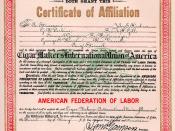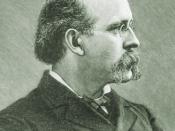The premise of this essay will hopefully provide a brief analysis of the historical class struggles of the American working class as well as discussing a few of the contemporary issues that Americas current working class must face during their challenges of socioeconomic mobility.
This will serve as an introduction to the labor movement in the U.S. Around the turn of the 19th century, the American industrial revolution took off and we as a nation have never looked back. We had progressed from a labor-intensive nation dominated by the southern planters to the leader of the industrialized world. Essentially, it forever changed the relationship between employer and employee. Thereafter, the former resided in the office, and his only endeavor was the capitalist driven self-interest of cold economics profit maximization; meanwhile the latter was left to toil in the monotony of the machines. These new merchants and executives seldom fraternized with their workforce, and they seldom visited their employees.
They were more concerned following the economic plans of Adam Smith, Jeremy Bentham, David Ricardo and the other classical economists than the health and safety of their employees. This created a fierce animosity or tension amongst the working class. In the past, the working class took great pride in their artisanship, productivity, and the mere creativity of their labor. "Thus as the principle of the division of labor is ever more completely applied, the workman becomes weaker, more limited, and more dependent." (De Tocqueville p556) Due to the introduction of mechanical capital into the factory process, workers were reduced from the status of artisan to a mere cog in the industrial machine of the American Aristocracy created by industry.
Between workman and master, there are frequent relations but no true association. I think that, generally speaking, the manufacturing aristocracy which we see...


